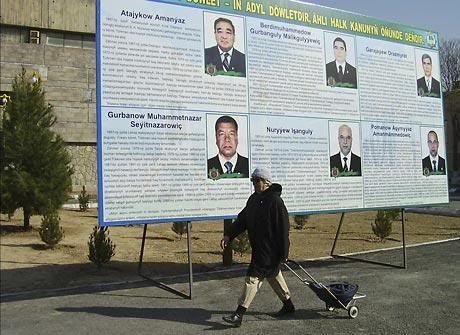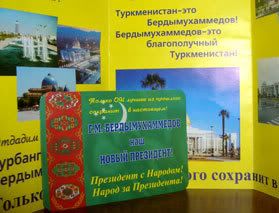The Myth of the Smooth Transition: Where is Turkmenistan Going Now that Elections Have Ended?


Yesterday, Turkmen citizens went to the polls to vote for a new president. For the Turkmen government, which kept foreign journalists out of the country during the polling, the election’s completion is likely a major relief. It seems, at least from the surface, that the elections mark the last stage of a calculated and orderly succession that began immediately following Saparmurat Niyazov’s death in late December. But, it may be too early to breathe a sigh of relief and declare Turkmenistan’s leadership transition a success.
Few people doubt that Gurbankuly Berdymukhammedov will win the election by a landslide, but it is less likely that Dr. Berdymukhammedov has taken over all the reins of power. Rumors still suggest, for example, that Berdymukhammedov is representing a shaky coalition of powerful people, particularly in the security organs. If this is the case, however, it begs the question of how Berdymukhammedov plans to manage his patrons once he is officially the new president of Turkmenistan. Afterall, it can be difficult for puppet masters to control their own creations as time progresses and the marionettes become empowered. In fact, with time, puppet master and puppet could easily switch roles or become enemies.
Furthermore, while Turkmenistan’s political elite under Niyazov was kept in check by the whims of the Great Turkmenbashy, who made sudden cadre changes and the arrests of officials a regular activity, the post-Niyazov thaw is already bringing the arena of Turkmen elite politics back to life. Last week, for example, it was announced that two ex-premiers who had been imprisoned under Niyazov (Yelli Gurbanmuradov and Dortkuli Aidogayev) had been released and placed under house arrest. While probably humbled by their time in jail, these two men (and especially Gurbanmuradov) are unlikely to go quietly into retirement. Gurbanmuradov, for example, is seen as the one person in Turkmenistan who can really manage the oil and gas sector. If he is brought in to do so again, it is unlikely that he will acquiesce without some assurances of a piece of the pie. The same could be said of the various Hokims who run Turkmenistan’s regional governments. The quiet and orderly way in which elections were carried out on Sunday speak to the present loyalty of regional Hokims to Berdymukhammedov, but that could quickly change if they think the president is cutting them out of the spoils of power. In short, Berdymukhammedov will need to juggle a variety of players and divide up a shrinking pie of resources if he is to maintain his power. In Turkmenistan’s present economic condition, that could be a difficult feat to manage.
These factors, however, remain theoretical problems for Berdymukhammedov today. He has succeeded in orchestrating a typical Central Asian election, which he will undoubtedly win. While some observers on the ground question official figures, the Turkmen government claims that over 98% of voters cast their votes on Sunday. While six candidates did run on at least nominally different platforms, the atmosphere of the elections appears to have remained one of complete control. And while Berdymukhammedov has pledged to change his country, at the moment things appear to be little different from life under Niyazov. In fact, as the segment from Turkmen television featured below demonstrates even to those who cannot understand the Turkmen language, it looks like little has changed (with the exceptions of the actors and the monuments) in Turkmenistan since about 1950.
But, if Berdymukhammedov does not deliver change soon after the election, he may be faced with a shaky foundation for his power. Today, he will celebrate, but tomorrow he better begin working hard to steer Turkmenistan’s economy away from likely disaster. And, in the process, he should begin thinking about how to balance the various political and economic forces in the country which will also be asserting themselves in the construction of a new government. I think it is fair to say that the smooth transition can expect some more bumps on the road for the near future. Let's hope that in the process all those promises of reform from the election campaign are not forgotten.
NOTE: Unfortunately, the person who had placed the broadcast from Turkmen TV on youtube has since removed it. Thus, you will not be able to view it anymore. Here, however, is a very interesting piece from Russia's NTV that discusses some of the challenges facing Berdymukhammedov's new government...enjoy!



4 Comments:
The video is not working.
Hi,
We'd like to translate this article into french and publish it on www.rsfblog.org. is that ok with you?
Regards,
Julien Pain
Reporters Without Borders
Mr. Pain,
You are welcome to do so as long as you include a link to my blog and the original version.
Done. It's been published on www.rsfblog.org. Thanks a lot.
Julien
Post a Comment
<< Home